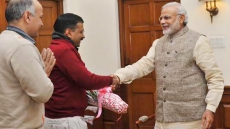IRBID, Jordan — It was four in the morning when Asma Dawaghreh fled her home with her sick husband and six children. With nothing but the loose change in her pockets, she packed her family into a car and left under the cover of darkness.
Her family is one of dozens uprooted every year in the kingdom under the tribal practice of "jalwa"— Arabic for "eviction"— in which an entire clan can be forced to relocate because of a crime committed by a family member.
In Dawaghreh's case, a nephew on her husband's side of the family stabbed his cousin to death, forcing three dozen relatives to flee their village in northern Jordan.
The Dawaghrehs fled pre-emptively, fearing revenge killings, and then found that they were barred from returning. In exile, they were pressured into selling their supermarket, the family's source of income.
Three years on, they have moved home six times and are increasingly impoverished.
"I can't even afford to buy bread now. What is my crime? What is my son's crime ... my husband's crime?" said the 40-year-old, speaking in the family's latest refuge, a run-down apartment in the northern city of Irbid. "We had no business in this."
Jalwa predates the 1946 founding of modern Jordan. It is rooted in tribal tradition, under which the practice was applied in cases of murder or rape when the assailant and the victim lived in the same area.
Although jalwa is not written into Jordanian civil law, the practice continues unchallenged — and sometimes with the support of civil institutions — because of the country's strong tribal influence. Over the years, tribal leaders and local authorities have arranged the forced relocation of hundreds of people across the country. In some cases, relatives of the attacker as distant as a fifth cousin have had to move.
Supporters say forced relocation prevents blood feuds between tribes, while critics denounce it as collective punishment.
The government is now trying to scale back the practice, proposing to limit forced relocation to the perpetrator and his immediate family. The initial period of banishment would be one year, with the possibility of extension.
The proposed amendment was adopted by the Cabinet earlier this year. It now awaits approval by parliament and a signature by King Abdullah II. If the amendment is passed, it will be the first time jalwa is enshrined in civil law.

An Interior Ministry official in charge of tribal affairs said the government is trying to adapt tribal law to modern times.
Jordanians have homes and jobs, and can't just pack up tents and move to a different area, as during their nomadic past, said the official, Turki Akho Arsheidah. "We have to implement these amendments to adapt to the 21st century."
Jalwa is still being practiced, to varying degrees, across the Middle East, with forced relocation more common in rural areas than in cities. Although some governments have tried to curb the practice — either through outright bans or by negotiating with tribes — the tradition remains powerful. This is particularly true in countries like Yemen, where the state has deteriorated.
Jordan is unusual because of the strong tribal influence on the government.
"In Jordan, tribal identity is connected to Jordanian identity," said Israeli historian Yoav Alon. Instead of ending tribal customs, the government has tried to strike a compromise with the tribes, who are the mainstay of the Hashemite monarchy.
In one high-profile murder case, hundreds of people were forced to leave the southern Jordanian town of Karak earlier this year in a jalwa deal negotiated by Deputy Prime Minister Mohammed Thneibat. As part of the agreement, the victim's clan reserved the right to kill any members of the assailant's family if they returned to the community, local media said at the time.
constitutional law expert Omar Jazi said jalwa amounts to collective punishment and violates the constitution.
"You cannot deprive anyone of his or her constitutional right, that can't be tolerated," he said. "Jalwa does not make sense within a civic society, within the rule of law, and within the type of society we are living in."
Some tribal leaders argue that reforms would be difficult to carry out and that Jordanians prefer the swift justice of tribal law.
"Civil law is weak, it could take up to six years or more for a court case to proceed," said Sheik Hayeel al-Hadeed, a tribal leader from the capital, Amman.
The plight of the Dawaghreh family illustrates the practical difficulties of enforcing jalwa in modern times.
Before the eviction, the family lived with other clan members in an apartment complex in a village south of Irbid. Dawaghreh asked that the name of the community be withheld, to avoid causing harm to relatives through renewed public attention.
They fled their home in 2013, almost immediately after receiving a call from a relative informing them of the killing.
A year later, some members of the assailant's clan reached a financial settlement with the victim's family, including payment of 50,000 dinars ($70,000) in blood money.
In theory, the deal enabled them to return — but Dawaghreh said she had been pressured to sell their supermarket to the victim's family.
As a result, the family bounced from apartment to apartment, struggling to pay rent.
Paint peels from the cracked walls of her current home in Irbid. Dawaghreh cooks or babysits to make money. Her husband, who has cancer, works as a security guard.
Dawaghreh wants jalwa abolished, but is not hopeful. "No one can interfere in the jalwa of the tribes, not the government, not the members of parliament ... not the ministries, nobody."



